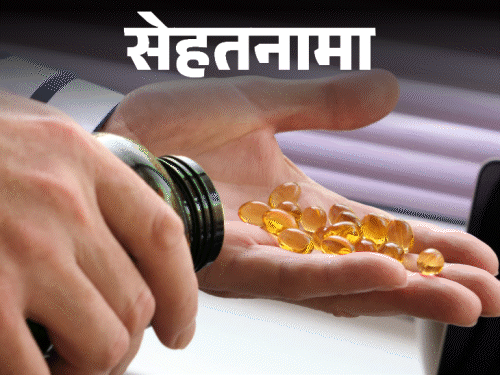Vitamin D is very important for our body. This vitamin strengthens bones and muscles. Due to vitamin D deficiency in the body, many types of diseases occur.
But do you know that having excess vitamin D in the body is also not good. This is called vitamin D toxicity or hypervitaminosis D. It is a serious disease and extremely dangerous for your health.
People who take excessive supplements or are prescribed medications to compensate for a vitamin D deficiency are at greater risk of vitamin D toxicity.
In October 2024, research was published on the online medical education platform touchENDOCRINOLOGY. In this context, a study was conducted on the clinical and biochemical profile of 91 patients suffering from hypercalcemia in a super specialty hospital in northern India. It has been found that hypercalcemia can occur due to vitamin D toxicity. Hypercalcemia means that the amount of calcium in the blood is higher than normal.
Therefore, people who take vitamin D supplements need to know how much vitamin D their body needs. So that they can avoid the danger of vitamin D toxicity.
Today in Sehatnama we will talk about vitamin D toxicity. You will also learn that-
What are the symptoms of vitamin D toxicity?
How important is vitamin D for the body?
The main function of vitamin D is to absorb calcium in the body. It helps strengthen bones, teeth and muscles, cell growth and regulate blood pressure. Due to its deficiency, the body is unable to absorb calcium, which leads to weakened bones and many other problems.
How much vitamin D does the body need?
According to a study published by the National Institute of Health, 20 ng/ml (nanograms per milliliter) of vitamin D is considered a normal level in the blood of a healthy person. Levels above 50 ng/mL are considered high. At the same time, if it is below 12 ng/mL, vitamin D deficiency may occur.
According to a study published in the Indian Journal of Endochronology and Metabolism, vitamin D deficiency can usually be compensated for by sunlight. A healthy person needs one hour of sunlight per day to maintain vitamin D levels.
When does vitamin D toxicity occur?
Vitamin D toxicity occurs when the level of vitamin D in the body increases too much. This causes a buildup of calcium in the blood, which can cause hypercalcemia. This is usually due to taking high doses of vitamin D supplements.
What are the symptoms of vitamin D toxicity?
Vitamin D toxicity can present with a number of symptoms, primarily caused by hypercalcemia. Its first symptoms include nausea, vomiting, loss of appetite, excessive thirst and feeling weak. Apart from this, there are other symptoms as well, understand it from the graph below:
How to detect vitamin D toxicity?
To find out, doctors first collect information about the patient’s symptoms and ask them about medications and supplements. On this basis, they carry out tests.
They may do a blood test to check the amount of vitamin D and calcium in the body. Apart from this, a kidney function test (KFT) can also be done to check the condition of the kidneys. Vitamin D toxicity can be detected using these tests.
Who is at higher risk of vitamin D toxicity?
Dr Arvind Aggarwal, senior consultant in internal medicine at Delhi’s Shri Balaji Action Medical Institute, says very few people suffer from vitamin D poisoning. But some people are at greater risk. Understand it with the pointers below-
People who take vitamin D supplements in large quantities without a doctor’s advice. People who take extra doses of vitamin D. People who take medications related to bone problems for a long time.
How is vitamin D toxicity treated?
Treatment for vitamin D toxicity primarily involves reducing blood calcium levels. To do this, doctors first stop taking vitamin D and calcium supplements. Usually this cures the toxicity.
If hypercalcemia occurs, doctors give intravenous fluids into the veins to treat dehydration. IV fluid is a mixture of water and sodium chloride, also called saline.
It is used to remove excess calcium from the body. In most cases this provides relief. But in some cases of severe toxicity, hemodialysis may also be necessary. In this, waste, salt and fluid are filtered from the blood through a machine.
What to do to avoid vitamin D toxicity?
There are simple solutions to avoid this. By adopting them, health problems caused by vitamin D toxicity can be avoided. Understand this from the graph below-
What to do in case of vitamin D poisoning?
If you experience symptoms of vitamin D toxicity, contact a doctor first. Stop taking vitamin D supplements immediately.
Do not consume any type of supplement without the advice of a doctor. Drink more water so that excess calcium can be flushed out of the body. Take the medicines prescribed by your doctor on time and have your vitamin D checked from time to time.
…………………..
Sehatnama- Why Winter Depression Cases Increase in Winter: Why It Happens, Identify It With These 7 Signs, 8 Important Tips From Doctor
The winter season has arrived. With the increase in cold weather, sightings of the sun have also become rare. Many people really like the cold. He looks forward to it. However, the cold can sometimes also cause sadness. Some people may experience seasonal affective disorder (SAD) due to cold weather and less daylight in winter. …

